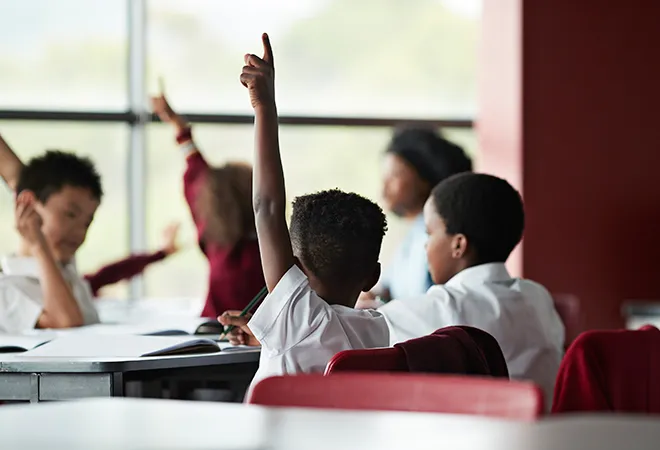-
CENTRES
Progammes & Centres
Location
It is time for Africa, and not just Malawi, to move beyond fee-free education and adopt targeted solutions to improve quality, accessibility and learning in schools – at not just the primary, but secondary levels as well.

In October last year, Bright Msaka, Minister of Education, Malawi announced the abolition of secondary school fee with immediate effect. This populist announcement was made against the backdrop of the upcoming Presidential elections in Malawi, Africa. After making primary education free up to the VIIIth Standard through an ambitious Right to Education (RTE) Act, India, too, is currently contemplating extending RTE to the secondary level. In Africa, several experts are arguing that such an impulsive decision can cause greater damage to the education system in the long-run. Instead, they are instead demanding that primary education should be strengthened before extending such facilities to the secondary level.
According to a report by the UNESCO on five Sub-Saharan African countries, “…the major lesson in implementing school fee abolition initiatives is that FPE
Unarguably, low-quality primary education is the root cause of the defunct education system in Malawi. In fact, India suffered through something similar post the implementation of the RTE Act in 2010. After nearly seven years of the RTE coming into effect, while India reached a near-perfect enrollment rate in primary education, studies showed low-levels of learning in children and decreasing attendance in schools. However, unlike India, Malawi has over 90.5 percent public schools (primary and secondary) and about 80 percent enrollment in public secondary schools. Thus, rather than the government solely focusing on primary education, the need of the hour is judicious distribution of funds, if not equitable, in both primary and secondary education.
Malawi and Uganda were one of the first countries to abolish primary education fee in the mid-90s, which led to an unprecedented surge in enrollment. This surge, however, negatively affected the quality and outcome of education – which naturally got carried over to secondary levels. Another important trend to note is that more children were accessing private schools for secondary education due to depleting quality of public schools. This meant that children from economically weaker sections were being deprived of quality secondary education because of poor strategic planning by the government, and the country witnessed large number of drop-outs in Standard IX, a majority of them being girls.
Malawi and Uganda were one of the first countries to abolish primary education fee in the mid-90s, which led to an unprecedented surge in enrollment. This surge, however, negatively affected the quality and outcome of education – which naturally got carried over to secondary levels.Thus, it is now imperative to target secondary education system (which is currently suffering from low enrollment, absenteeism, skewed teacher-pupil ratio and depleted resources) to be able to sustain this extraordinary increase that followed the FPE movement. Any policy implications in primary education will take at least 10 to 15 years to reap results and it is unfair for one generation, if not more, to lose out entirely on quality secondary education. Moreover, given that only 10 to 15 percent of the labour force in Sub-Saharan Africa is engaged in modern employment, there is an increasing demand for vocational skills at the secondary level that would eventually contribute towards the much-needed economic growth of Malawi.
There is an increasing demand for vocational skills at the secondary level that would eventually contribute towards the much-needed economic growth of Malawi.
Interestingly, most recommendations by experts are almost always centered on strengthening primary education. Given that Malawi increased its expenditure on education to 17.45 percent in 2016-17 (20 percent being the global standard) and has already invested more at the primary level than the secondary level, adopting regular solutions to boost primary education would only widen the divide between primary and secondary education and create a generation of unemployable youth. In addition to increasing the overall education budget, the government perhaps needs to now focus on efficient and targeted spending, especially to meet the socio-cultural challenges in the Malawi society.
In addition to increasing the overall education budget, the government perhaps needs to now focus on efficient and targeted spending, especially to meet the socio-cultural challenges in the Malawi society.One such aspect being that of gender representation. Like Malawi, India, too, suffered through low participation of girls in education. Realising the urgency, India launched a campaign called ‘Beti Bachao Beti Padhao’ (Save the girl child, Educate the girl child) in 2015, which focuses on multi-sectoral action in 100 districts with low Child-Sex Ratio, by ways of social mobilisation, communication and on-ground targeted programmes. Consequently, beyond communication, even building toilets in schools effectively increased enrollment and participation of girls in school. Another effective way to sustain primary enrollment in India has been the mid-day meal scheme, where the government provides nutritional meals to all students who attend school, many of whom come from economically-backward families. Reportedly, there has been visible improvement in the attendance and health of students post introduction of this scheme in public schools.
Like Malawi, India, too, suffered through low participation of girls in education.Like India, currently Africa, too, has a young demographic that needs to be nurtured towards positive growth. This will only possible be if Africa invests rightfully in its youth through strategic programmes on education and health. At this juncture, it is extremely important for it to enhance the skills of its student population – so that they can positively participate in nation building. It is time for Africa, and not just Malawi, to move beyond fee-free education and adopt targeted solutions to improve quality, accessibility and learning in schools – at not just the primary, but secondary levels as well.
The views expressed above belong to the author(s). ORF research and analyses now available on Telegram! Click here to access our curated content — blogs, longforms and interviews.

Priyanshu Agarwal Student Member Centre for Law and Society Gujarat National Law University
Read More +